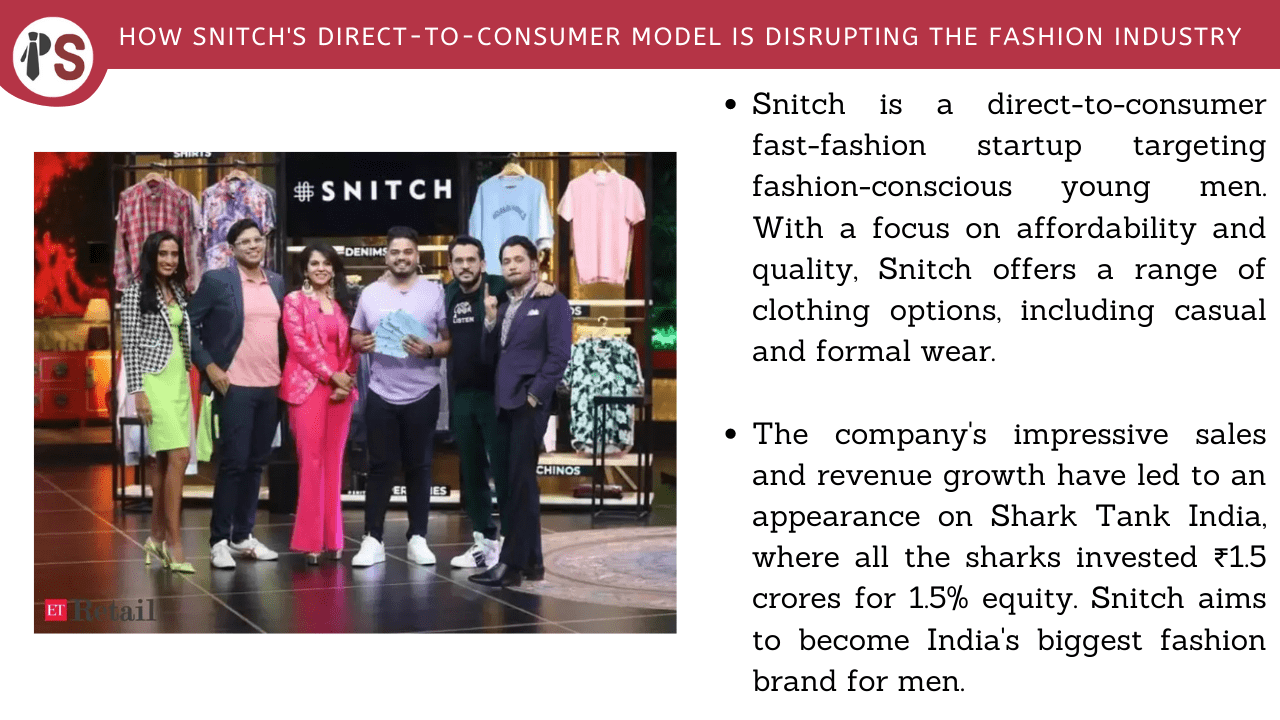
Snitch is a fashion startup founded in 2020 by Siddharth R Dungarwal, a 35-year-old commerce graduate from Bangalore. Siddharth, who had been involved in his family's jewelry business, began selling procured materials from factories in retail, before starting his own manufacturing business in 2012. However, he later identified a gap in the market for stylish and fashionable men's clothing and decided to launch Snitch.
Snitch is India's fastest-growing fast fashion brand for men, with a vision to become India's biggest fashion brand for men and to capture the global market. The brand's products, including shirts, t-shirts, denim, and more, are available on their own website and app, making shopping easy and convenient for customers. Snitch is one of the first brands to launch a cohort set for men, and all the clothes are made in India, positioning the company as a mass premium brand.
The aim of Snitch, a fashion startup founded in 2020, is to provide stylish and fashionable men's clothing to customers in India and beyond. The company's vision is to become India's biggest fashion brand for men and to capture the global market.
Snitch aims to address the gap in the market for stylish and exciting men's clothing, providing options that are on-trend, colorful, and glamorous. The startup's website and app make shopping easy and convenient for customers, allowing them to access a range of products, including shirts, t-shirts, denim, and more, from the comfort of their homes.
Initially, Snitch operated as a B2B brand, selling manufactured clothes to retailers. However, the company shifted its focus to direct-to-consumer sales through their website and app due to the pandemic, allowing them to expand their market reach and offer their products to a broader audience.
With a commitment to quality, Snitch aims to provide top-notch clothing that can compete with big brands in the market. The startup has registered impressive growth, processing over 2000 orders daily, and with more than 50,000 daily active users and over 5 lakh app downloads. Snitch's aim is to continue expanding its reach and to establish itself as a leading fashion brand for men in India and beyond.
The business model of Snitch, a fast-fashion startup, is a direct-to-consumer model. The company sells its products, including shirts, t-shirts, denim, and more, through its website and app, allowing customers to shop from the convenience of their homes. The startup's focus on a direct-to-consumer model has allowed them to expand their market reach and target a broad audience.
Snitch's target market is young men who are fashion-conscious and looking for stylish and trendy clothing options. The startup aims to provide men with clothing that is exciting, colorful, and fashionable, helping them express their individuality and sense of style. Snitch offers a range of products, including casual and formal wear, catering to a wide range of fashion needs.
With a mass-premium brand positioning, Snitch offers high-quality clothing at an affordable price point. The startup's goal is to capture the global market and become India's biggest fashion brand for men. Their direct-to-consumer model allows them to offer competitive prices while maintaining quality and meeting the demands of their target audience.
The startup has achieved impressive sales and revenue growth. Last month's sales were ?9 crores, with revenue of ?6 crores generated from their own website. They also earned ?1 crore in revenue from the marketplace and ?2.3 crore from the B2B offline channel.
The COGS (Cost of Goods Sold) for Snitch is 42%, indicating that the company is spending a significant portion of its revenue on producing its products. However, the gross margin of 48% suggests that the company is making a healthy profit on its sales. Snitch's marketing costs are 28%, indicating that the company is investing in promoting its brand and products to its target audience.
Snitch's shipping cost and operating cost are 10% and 9%, respectively, which shows that the company is managing its logistics and operations efficiently. The EBITDA (Earnings Before Interest, Taxes, Depreciation, and Amortization) for Snitch is 5%, indicating that the company is generating a profit after accounting for all of its expenses.
Snitch is a fully bootstrapped company with a loan of ?4.5 crores, indicating that the company has managed to grow and generate revenue without external funding. In the financial year 21 to 22, Snitch's sales were ?44 crores, and they are projected to achieve sales of ?100 crores in the financial year 22 to 23.
Snitch appeared on Shark Tank India seeking an investment of ?1.5 crores for 0.5% equity in the company, with a company valuation of 300 crores.
All the sharks on the show made an offer of ?1.5 crores for 1.5% equity in the company, with a company valuation of 100 crores. This means that the sharks valued Snitch at a lower valuation than what the owner had proposed.
After some negotiations, the owner of Snitch ultimately decided to accept the offer from all the sharks, which meant giving up 1.5% equity in the company in exchange for the ?1.5 crores investment.
This deal would give Snitch the much-needed capital to continue its growth and expansion plans. In addition, the sharks' investment and guidance could provide Snitch with valuable expertise and connections in the fast-fashion industry.
Overall, Snitch's appearance on Shark Tank India and subsequent investment deal with the sharks indicate that the company has gained recognition and credibility in the business world and is on a path towards further success.
At Professional Saathi, we offer a range of business consultancy services that help businesses improve their performance, achieve growth, and overcome challenges.
Copyright 2026 © Created By KTPG PROFESSIONAL SAATHI CORPORATE CONSULTANT PRIVATE LIMITED, All Rights Reserved.
Leave Your Comment